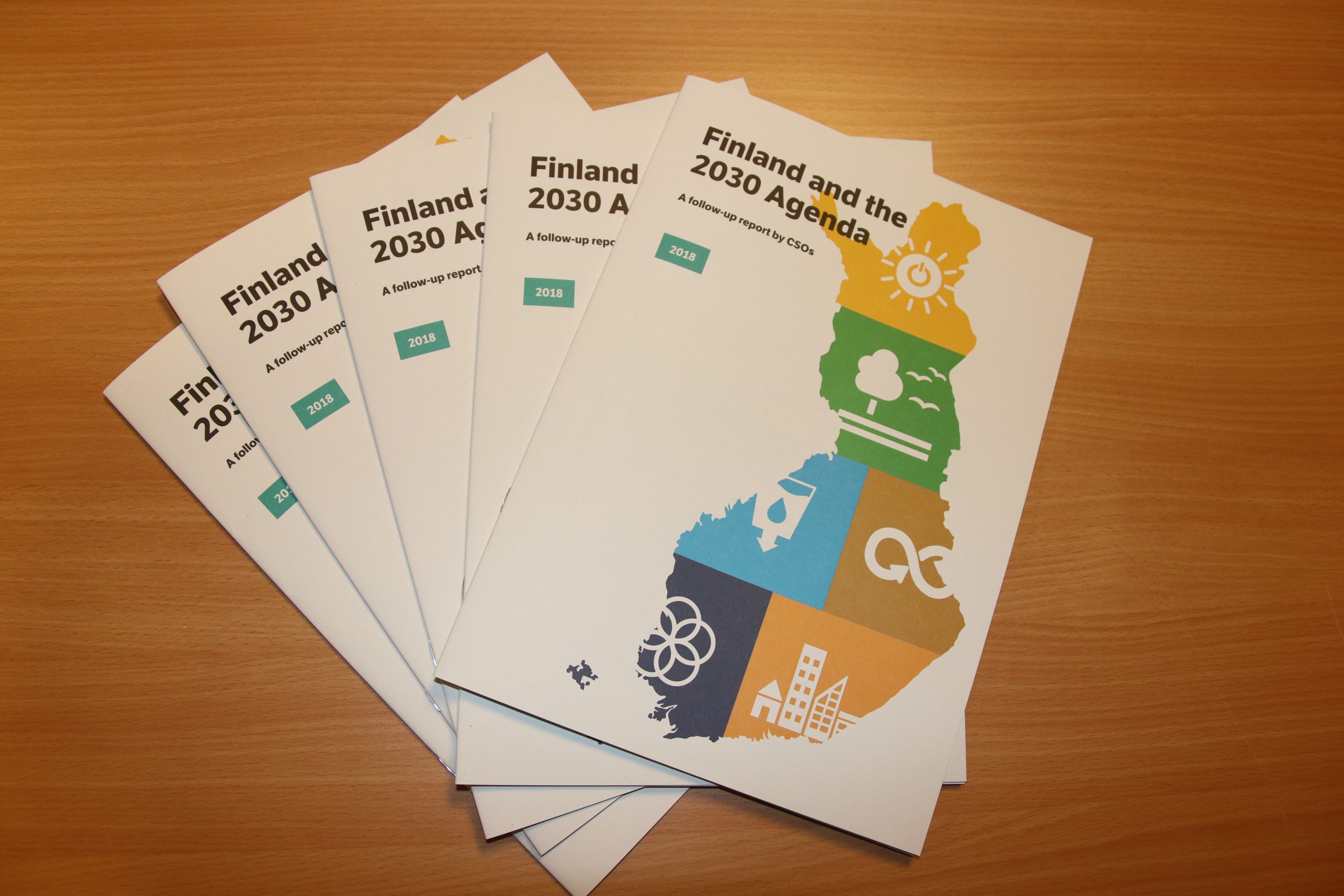Finland has justly received positive feedback for involving civil society in the implementation of sustainable development. The national indicators required to monitor Finland’s progress were defined in a multi-stakeholder group with several CSO representatives.
CSOs also have permanent representation in such institutions as the Sustainable Development Committee and the Development Policy Committee.
Besides being in the spirit of the 2030 Agenda, multi-stakeholder cooperation is also a wise thing to do. It is worthwhile involving the experience and know-how of all social actors in promoting sustainable development.
In Finland and the 2030 Agenda report, seven Finnish CSOs share their long-term experience and knowledge of enhancing sustainable development in Finland.
Finland and the 2030 Agenda report covers the six Sustainable Development Goals highlighted at the High Level Political Forum in New York: Clean water and sanitation (SDG 6), Affordable and clean energy (SDG 7), Sustainable cities and communities (SDG 11), Responsible consumption and production (SDG 12), Life on land (SDG 15) and Partnerships for the goals (SDG 17).
* * *
Climate change mitigation is one of the most essential sectors of sustainable development, and it relates to the other sectors. Finland ranked poorly in the recent report on EU countries´ ambition and progress in fighting climate change, scoring lowest among the Nordic countries.
We have a particularly negative stance on forest and land-based emission management, plans to increase forest logging and thus dramatically reduce its carbon sink. Increased logging threatens also diversity of forest nature. There is lots to do, but Finland and the 2030 Agenda report offers recommendations on how to go forward.
On the positive side, the government is expected to propose a bill on the second half of 2018 to stop the use of coal as an energy source by 2029. It also promises support for power plants that stop using coal in a faster timeframe.
This is a welcome move, although the target date should be 2025. There is need also for political action to end the use of peat by 2025, for far more support for developing countries’ climate actions and for advancing different local and communal clean energy solutions.
* * *
Besides climate change, our natural environment will be threatened by administrative turmoil, if the resources and effectiveness of nature conservation are not secured by current reforms.
The latest version of the regional government model being worked out removes the rights of civil servants to appeal when considering certain projects, for example if they are ecologically unsustainable.
There is also a fear that planning would be weakened in terms of the control of environmental permits. For good reason, the proposed model raises concerns about how ecological values and biodiversity are to be safeguarded and environmental degradation prevented.
* * *
Finland and the 2030 Agenda report also shows that it’s crucial that the overall impact of our consumption is understood in decision-making. For example, almost half of Finns’ water footprint is caused by production chains outside Finland.
The group selecting the national indicators made the startling observation that there is no reliable or even partially comprehensive information available in Finland on the external impacts of Finnish consumption, i.e. how we exploit natural resources outside of our own country.
This kind of information is crucial for estimating our global impact and taking responsibility for our consumption in a more sustainable direction.
The products we consume contain linkages to child and forced labour that is often unpaid, or to wages barely covering basic needs of life. Studies show that 68 per cent of Finns find it important or very important that the product or service they buy is produced responsibly. Three out of four Finns are ready to pay more for a product that is produced responsibly.
The Finnish government and municipalities could increase responsibility, among other things, by legislation, by integrating responsibility into their own purchasing strategy and by strengthening resources and proficiency of the personnel responsible for public procurement.
* * *
The Finnish parliamentary elections are coming up in April 2019. Before a new government is elected, an external evaluation will be conducted on the national implementation of the 2030 Agenda programme during the current government period. This will provide valuable information for next government.
The next government is going to make the very first programme following the 2015 agreements on the Sustainable Development Goals, and the Paris Agreement on climate change.
These commitments will also be binding on Finland’s next government. CSOs in Finland are expecting strong commitment and great investments into sustainable development.
* * *
Finland and Agenda 2030 report 2018 is the second in a series of follow-up reports. It is published as part of the international Spotlight report package coordinated by Social Watch in HLPF on 12th of July.
